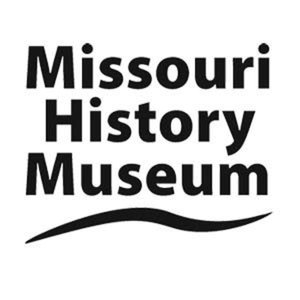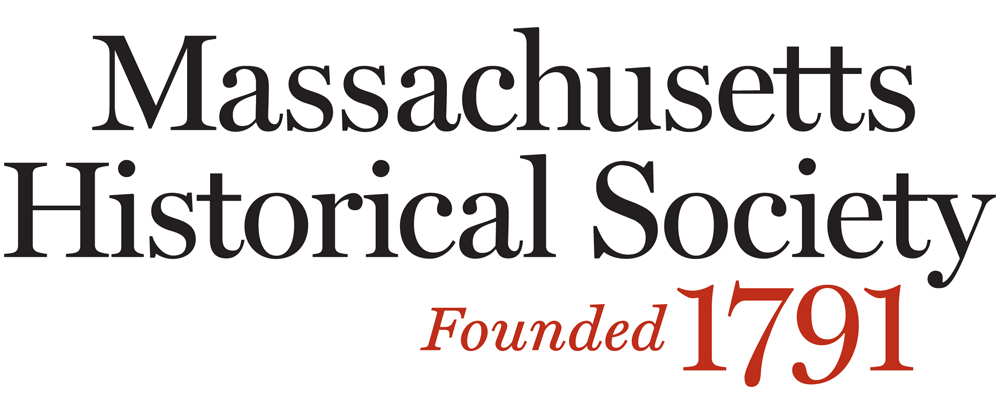from Apr. 18, 1865
Mary Farren to Solomon F. Smith
-
Full Title
Letter of Mary [Mary Farren], New York, to Uncle Sol [Solomon F. Smith], April 18, 1865
-
Description
Gives her reaction to the assassination of President Abraham Lincoln. States, ". . . .I presume the horrible occurance of last Friday, has thrown a gloom over St. Louis, as everywhere else. I fear the measures were so well taken that the principal criminal will escape. What a dreadful calamity to befall his family. His poor old Mother, had he no human feeling left, that he could crush her in her declining years with such a blow. Edwin [Edwin Booth] it is said is perfectly prostrated. His career in all probability blighted forever. . . .By the way the name of Actor is not in much favor here at present. I was told the Detectives watch them pretty closely. . . ."
-
Source
Missouri History Museum
-
Rights
This item is in the public domain.
-
Tags
-
Cite this Item
Farren, Mary. "Letter of Mary [Mary Farren], New York, to Uncle Sol [Solomon F. Smith], April 18, 1865". Remembering Lincoln. Web. Accessed June 15, 2025. https://rememberinglincoln.fords.org/node/314
from Apr. 18, 1865
Letter of Mary [Mary Farren], New York, to Uncle Sol [Solomon F. Smith], April 18, 1865
![Letter of Mary [Mary Farren], New York, to Uncle Sol [Solomon F. Smith], April 18, 1865](https://rememberinglincoln.fords.org/sites/default/files/Mary%20Farren%20Letter%201.jpg)
-
Description
Gives her reaction to the assassination of President Abraham Lincoln. States, ". . . .I presume the horrible occurance of last Friday, has thrown a gloom over St. Louis, as everywhere else. I fear the measures were so well taken that the principal criminal will escape. What a dreadful calamity to befall his family. His poor old Mother, had he no human feeling left, that he could crush her in her declining years with such a blow. Edwin [Edwin Booth] it is said is perfectly prostrated. His career in all probability blighted forever. . . .By the way the name of Actor is not in much favor here at present. I was told the Detectives watch them pretty closely. . . ."
-
Source
Missouri History Museum
-
Rights
This item is in the public domain.
-
Creator
Farren, Mary
-
Date
April 18, 1865
from Apr. 15, 1865
Telegram of J. B. Montgomery
-
Full Title
Contemporary copy of telegram of J. B. Montgomery, Navy Yard, Washington, D.C., to Joseph Smith, Rear Admiral, Chief of Bureau Yards, Navy Department, April 15, 1865
-
Description
Inquires if the yard bell should be rung on Monday morning [for Abraham Lincoln's funeral service].
-
Source
Missouri History Museum
-
Rights
This item is in the public domain.
-
Tags
-
Cite this Item
Montgomery, John Berrien, 1794-. "Contemporary copy of telegram of J. B. Montgomery, Navy Yard, Washington, D.C., to Joseph Smith, Rear Admiral, Chief of Bureau Yards, Navy Department, April 15, 1865". Remembering Lincoln. Web. Accessed June 15, 2025. https://rememberinglincoln.fords.org/node/325
from Apr. 15, 1865
Contemporary copy of telegram of J. B. Montgomery, Navy Yard, Washington, D.C., to Joseph Smith, Rear Admiral, Chief of Bureau Yards, Navy Department, April 15, 1865
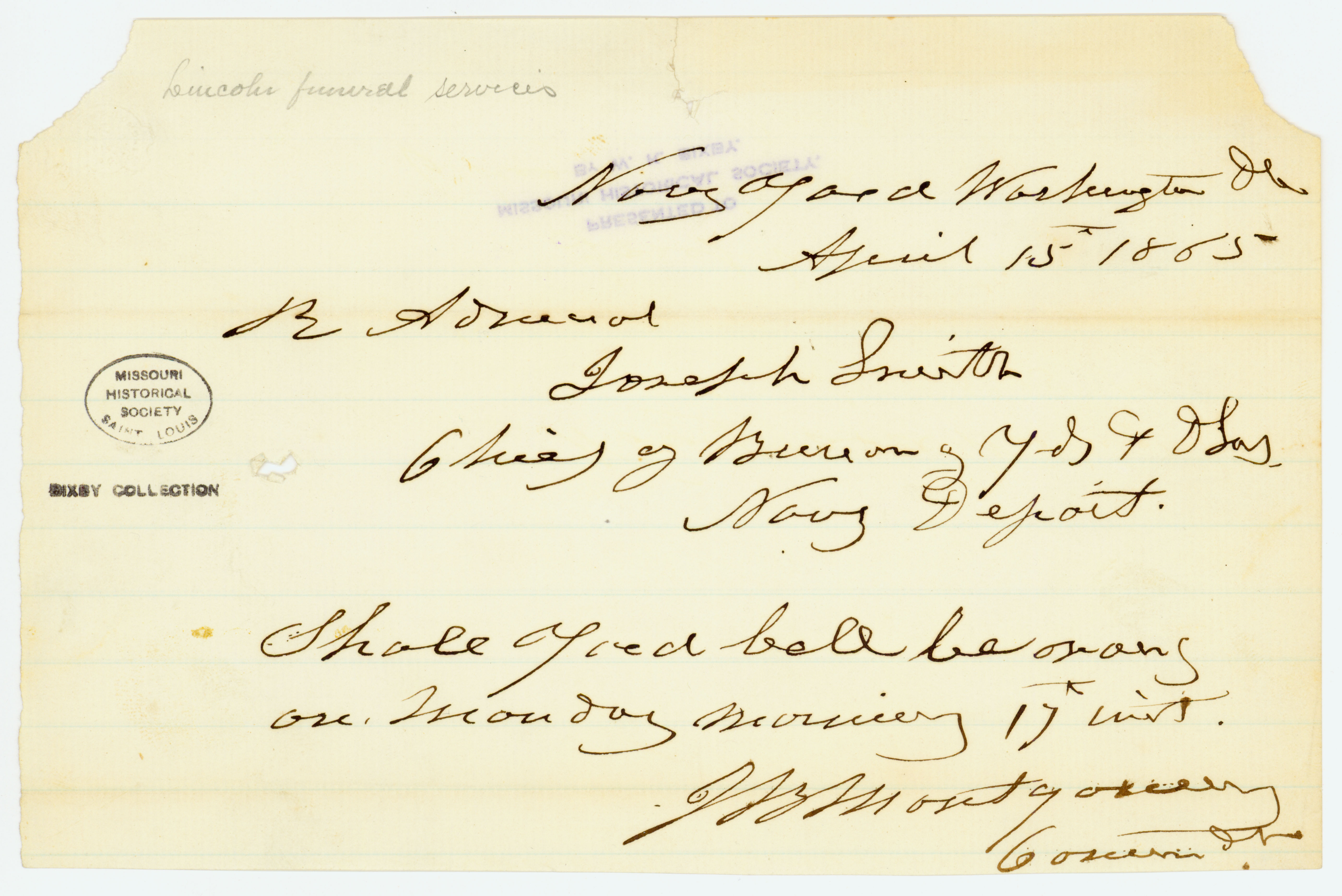
-
Description
Inquires if the yard bell should be rung on Monday morning [for Abraham Lincoln's funeral service].
-
Source
Missouri History Museum
-
Rights
This item is in the public domain.
-
Creator
Montgomery, John Berrien, 1794-
-
Date
April 15, 1865
from Apr. 17, 1865
General Orders, No. 69
-
Full Title
General Orders, No. 69, War Department, Adjutant General's Office, Washington, April 17, 1865
-
Description
Gives notice of the closing of the War Department on the day of the funeral of the late President and the suspension of labor at all military posts and all public works under the direction of the War Department, and orders flags to be flown at half-staff.
-
Source
Missouri History Museum
-
Rights
This item is in the public domain.
-
Tags
-
Cite this Item
Nichols, W. A.. "General Orders, No. 69, War Department, Adjutant General's Office, Washington, April 17, 1865". United States. War Department. Remembering Lincoln. Web. Accessed June 15, 2025. https://rememberinglincoln.fords.org/node/324
from Apr. 17, 1865
General Orders, No. 69, War Department, Adjutant General's Office, Washington, April 17, 1865
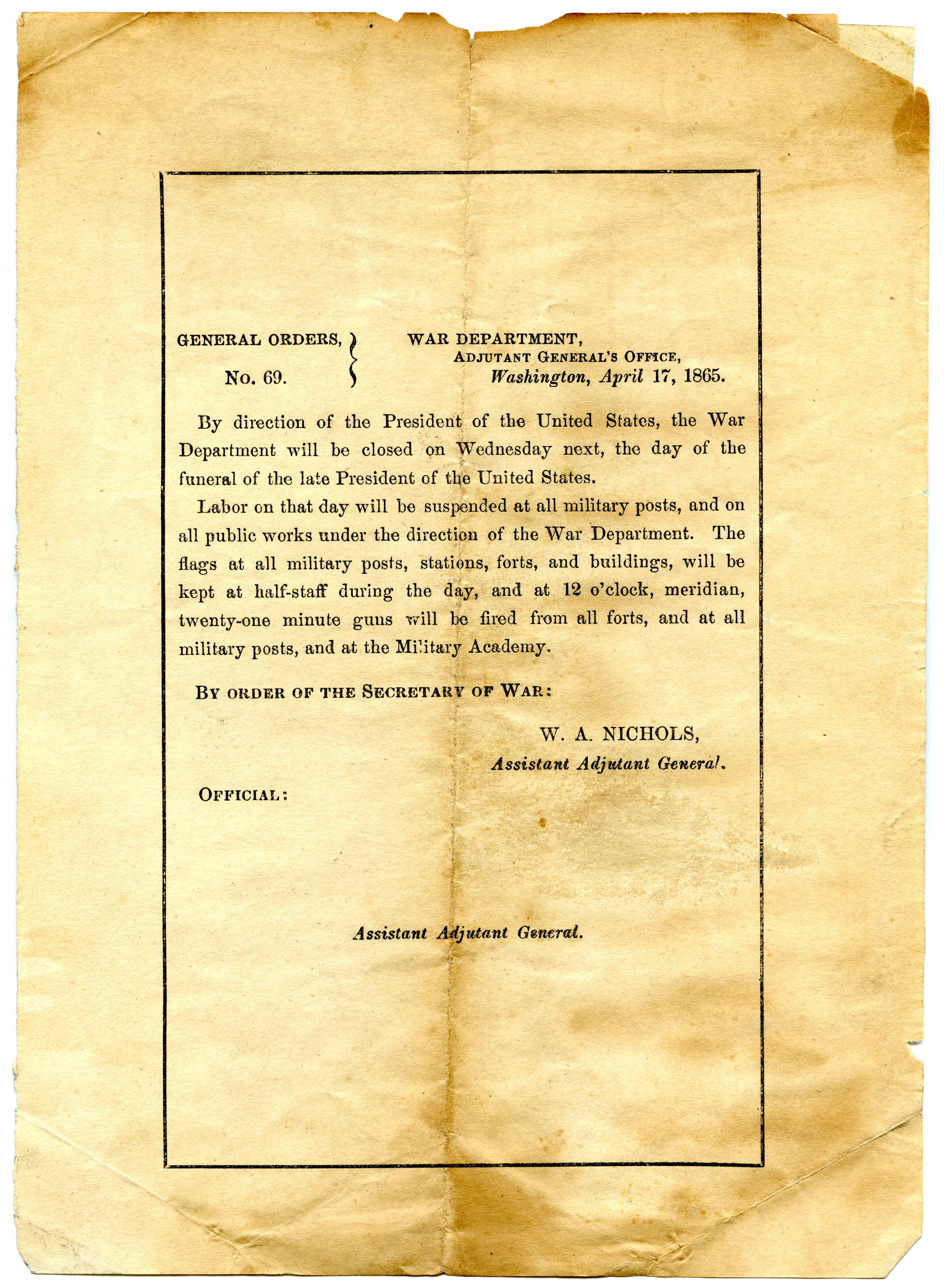
-
Description
Gives notice of the closing of the War Department on the day of the funeral of the late President and the suspension of labor at all military posts and all public works under the direction of the War Department, and orders flags to be flown at half-staff.
-
Source
Missouri History Museum
-
Rights
This item is in the public domain.
-
Creator
Nichols, W. A.
-
Publisher
United States. War Department
-
Date
April 17, 1865
from Jun. 6, 1865
M.J. Miller to Linda Miller
-
Full Title
Letter of M. J. [Monroe Joshua Miller], Montgomery, Ala., to Linda, Lebanon, Illinois, June 6, 1865
-
Description
Mentions his disappointed in not being mustered out. Regarding the news of the President's amnesty proclamation and the news of General Lee's arrest. States that he is realizing the impact of Lincoln's death, since Lincoln never would have acted as President Johnson has done.
-
Transcription
Montgomery, Ala.,
Tuesday, June 6, 1865
My Dear Linda:
I don’t like to write when I am feeling so disappointed and mean, yet you will want to get news of some kind whether I am feeling good or bad. When I wrote the other day, we were expecting to start homewards Monday (yesterday) but Sunday afternoon word came to us that this mustering out business was suspended for the present in this Department. You may guess how we were “sot back” by this piece of news. I felt like cursing black and blue every man who had anything to do in bringing such an order about. From what we heard it seemed evident that Old Smith was the chief cause of it— he wanting to keep as large a command as possible. But now it is intimated that he wanted to give the officers a chance to receive as much of their pay, before leaving the service, as possible. Paymasters having arrived with orders to pay all troops not under orders to be mustered out, the mustering-out order was withheld from us. So they say. They say also, that so soon as we are paid, we’ll get the order to start. I’m afraid it’s not true. We will be paid tomorrow four months pay. This delay can only accommodate the officers, because always when troops are mustered out the men are paid off anyway in full; but the officers pay kept back (several months of it) until they settle up their accounts with the Government. If we are paid four months tomorrow, there will still be about that much due them when we leave the services. But that is “none of my funeral.” It only troubles me to be kept so long in the service on account of other money-grabbers. All they talk about is their money— how to get it all, &C. I get so sick hearing it. Yesterday we received the President’s amnesty proclamation, and the news of Gen’l Lee’s arrest, &c. We now begin to realize how much we lost in the death of Lincoln. He never would have acted as Johnson is doing. It is most unfortunate I think, though others here say that is the right course. I don’t believe it. The civilized would will denounce such a course. And I fear the war will break about anew, and continue for years. The proclamation pardons a few, and excepts the great majority of the Southern people. But I have no heart to talk about these troubles. We don’t get out of one until we are plunged into another. Nothing but a superhuman Power can save us from utter ruin. I think it’s dreadful that we should be so heavily afflicted by our own ambitious rulers. But excuse me for writing what will make you feel worse than you would without any letter at all. Still you know my failings, and probably can make some allowance for them. If you can be more hopeful than I am, I am glad of it. It does not help matters to lament so about them.
The Col. is detailed on a Committee to examine the officers of our Brigade— to report their characters and their wish to remain or not to remain in the service. The order appointing such a com. created considerable debate— some contending that they had no right to examine any officers but those who want to go into the Regular army. Among other warm discussions, one sprung up between the Col. and Maj. Olden. It continued until the Col. avowed himself insulted and walked off. That was yesterday morning. I don’t think they have spoken since. They were both in fault. The Col. ought to know better than to argue with such an unprincipled savage as the Major. Sic Transit egotism!
O dear me! What hot weather we have here. And so dry and dusty. It’s awful. It’s dreadful. I do long to be up and going— homewards. I am so afraid something will turn up to compel us to stay till the 19th of September. That would be almost unbearable. I want so much to see my wife and my May. I am thinking of you almost constantly and wanting O so much to be with you daily and nightly. O may that happy day soon come to us. We will then, God willing, be so happy together. Would that I could fly to you, my sweet wife, and clasp you to my heart this very day.
Ever your own true husband,
M. J. Miller
P. S. If it so turns out that we shall be kept in the army a month or two, I will send you money the first opportunity I have. Otherwise I will bring it home myself. It’s a tremendous amount anyway! It almost makes me sick when I think how much time I have thrown away.
M. J.
[Transcription by: Evan Laugen, Chandra Manning's class, Georgetown University]. -
Source
Missouri History Museum
-
Rights
This item is in the public domain.
-
Tags
-
Cite this Item
Miller, Monroe Joshua, 1830-1866. "Letter of M. J. [Monroe Joshua Miller], Montgomery, Ala., to Linda, Lebanon, Illinois, June 6, 1865". Remembering Lincoln. Web. Accessed June 15, 2025. https://rememberinglincoln.fords.org/node/321
from Jun. 6, 1865
Letter of M. J. [Monroe Joshua Miller], Montgomery, Ala., to Linda, Lebanon, Illinois, June 6, 1865
![Letter of M. J. [Monroe Joshua Miller], Montgomery, Ala., to Linda, Lebanon, Illinois, June 6, 1865](https://rememberinglincoln.fords.org/sites/default/files/145-M.J.%20Miller%20Letter%2C%20page%201.jpg)
-
Description
Mentions his disappointed in not being mustered out. Regarding the news of the President's amnesty proclamation and the news of General Lee's arrest. States that he is realizing the impact of Lincoln's death, since Lincoln never would have acted as President Johnson has done.
-
Source
Missouri History Museum
-
Rights
This item is in the public domain.
-
Creator
Miller, Monroe Joshua, 1830-1866
-
Date
June 6, 1865
from Apr. 25, 1865
M. J. Miller to Linda Miller
-
Full Title
Letter of M. J. Miller, In camp 12 miles south of Montgomery, Ala., to Linda, April 25 and 29, 1865
-
Description
Describes the country his regiment has traveled through on the way to Montgomery, Alabama. Comments on his dislike of stealing on the road and his avoidance of doing so with the other men in his regiment. Mentions hearing the news of the surrender of Lee to Grant and the assassination of President Lincoln. Expresses his fear that the assassination will lead to a prolonged war. Describes his eagerness to see Linda and make the acquaintance of their 10-month-old daughter, May.
-
Transcription
In camp 12 miles south of Montgomery, Ala.
Tuesday, April 25, 1865
My own Darling Linda:
I hasten to write to let you know of our safe arrival thus far. I suppose we will have an opportunity to sent mail homewards when we get to Montgomery. And you will be wanting to hear from me. If you do not hear, it shall not be my my fault. The last two weeks we have been in “the wilderness”— emphatically in “the wilderness.” Never before have we traveled thro’ such a country— so poor and so piney. The last few days the country has been some better — more populated and more civilized seemingly. The distance from where we started on Fish River is nearly 200 miles— and Greenville is the only town we saw on the way. That is a small affair 14 miles below our present camp. Fortunately we had good weather most of the time. When it did ran, it poured, and then the roads grew almost impassable. One day we could only make 5 miles in the mud, and next day only 7 miles. But altogether, we have reason to be thankful that we have got along so well and had no fighting of consequence. I have had good health, and have avoided stealing. One day Fike wanted me to go out “foraging,” and I got off by giving another man my horse to go in my stead. I got very tired walking that day, but I’ll walk all the time rather than do what I hate as I do that business. Our officers look upon me as a worthless, unsoldierly fellow, but I don’t care. They say nothing to me, but I understand. I have been hoping that this would be our last march,— have been wishing it O so much—but there is no certainty of it. We have had lots of reports, but don’t know what to believe. On the 19th, a couple officers joined us from below. They left Mobile a few days after we did, and brought the news that Lee had surrendered to Grand, and that the way was about played out. The news was communicated to the troops as they were marching along, and cheer after cheer rang along the line and every fellow felt at liberty to fire his gun. It sounded like a battle opening, and some thought it was until they heard the news. When we arrived at Greenville a couple days afterwards, Lee’s surrender being confirmed by an official dispatch brought by Gen. Grierson to Gen. Smith, 200 guns were fired in honor of the great event. We have all been feeling good over the prospect of peace at an early day. But last night we had a report that Lincoln has been assassinated. We don’t believe it, but fear it may be so, —and dread the consequences — a prolongation of the war. It can do the Rebels no good, if it is true. It will only exasperate our soldiery to such an extent that a war of extermination will be waged. Such is the opinion, at least, of some who out to know.
We expect to go into Montgomery this afternoon. I will add something to this note after we get there if I have a chance. I am very anxious to know what we are going to do—what the programme will be. We expect to have the river open from Mobile up to Montgomery and get supplies that way. Don’t know though, for certain. Some seem to think we will stop here some time, but I don’t think it will be long. I have been so hoping that I would see the war over in a few weeks. I shall be miserably disappointed if the good news we have been getting proves all untrue. It will be almost killing. Still I shall not give it up until I hear farther. I do want to hear all the real news more than I ever did anything in my life. I have been so hopeful that we would soon be together— in love and happiness at home. O how blissful even to think of! May God forbid that our hopes should prove in vain! May is now nearly 10 months old. How interesting and sweet she must be! Would and Heaven that I could see her and Talk to her and become acquainted with her so that she would love me. And I am still more anxious to see my Linda— my own darling wife. O may the Time hasten on when we shall meet “ne’er to sever.”
Saturday, April 29, 1865
We have poor encouragement to write, yet I will have a letter ready anyway. We expected to find our gunboats and transports here, when we arrived, but they have not yet made their appearance. It is reported that Dick Taylor is below here, blockading the river. All he can accomplish will not amount to much. He will injure the citizens hereabouts more than our army. As long as there is corn and meat in the country, the 16th army corps will not starve. But it’s very unpleasant to be cut off from all communication with the rest of the world. I can very anxious to hear from home— and to learn how the peace movement progresses. Here we get nothing but rumors. But the citizens begin to acknowledge that the Rebellion is a failure. That’s a symptom of some significance— especially in this heart of Rebeldom.
We camped on a creek below the city until day before yesterday morning. Then our Division marched through Montgomery with all the music and pomp it could scare up, and went into camp 2 miles north of town, in the woods, where we shall remain until we are ordered away! Montgomery is a place about the size of Belleville, though it contains a State House and some finer residences than I ever noticed in that city.
When I wrote Tuesday, I was feeling quite well, but I took cold and have been nearly sick since. Yesterday I lay in bed most of the time, and to-day I still have some fever and ashes. This is a singular time of year to be troubled with cold, but I never was nearer sick with it than I have been the last few days— not excepting that awful time at Eastport, though I do hope it will not last as long as that did. If I can only keep well, and get home and find you and May and mother well, O I shall never cease to be grateful. I shall be so glad. We shall be so happy— All of us— together at home— never again to take any more of those painful farewells. It has been a long, long time since I heard from you. You were still at Lizzie’s then. I do want a letter so much. So many things may have happened. May is 10 months old today. I do hope I shall get home by the time she is 12 months old, if not before. I think most of our officers would like to stay their three years out— to have the name of serving three years,— and their pay is increased. But if I could say so, not one day more would any of us remain in the army. I want the thing to end now, and forever. And if half the reports we have are true, the end cannot be very far off. “Let it come, I repeat, let it come!” Then if anybody should ever again attempt another Rebellion, I imagine he would be shut down on a little more promptly than Jeff. Davis and his co-traitors were, four years ago. If our boats do not get up before long, I expect part of this corps will be sent down the river to clear the way. It is certain if we remain here, we will have communication open with Mobile, or some other point. The Alabama River is a stream about like the Cumberland. If the war ends, Railroads will soon be in running order from here to Huntsville, Mobile, and Vicksburg. At present, these roads do us no good. It is unlucky for us that we are caught so far from home when peace is expected any day. But accidents will happen.
Lots of our officers and soldiers are downtown every day. I shall go when I feel better. Krafft went yesterday— Also the Col. Chaplain and others. Nearly all the business houses in town are closed! One hotel and one printing office continue to run. Confederate money is dead while we are here— and it may not be raised again if we leave. Though greenbacks might as well be dead for all the good they do us. We have 6 months due us, but no immediate prospect of being paid! No doubt it will come some day. We draw corn meal now instead of crackers. There is a large mill in Town. Excuse this “mixed” letter. Be of good cheer, dear wife. I am ever your true and devoted husband.
M. J. Miller
[Transcription by: Evan Laugen, Chandra Manning's class, Georgetown University]. -
Source
Missouri History Museum
-
Rights
This item is in the public domain.
-
Tags
-
Cite this Item
Miller, Monroe Joshua, 1830-1866. "Letter of M. J. Miller, In camp 12 miles south of Montgomery, Ala., to Linda, April 25 and 29, 1865". Remembering Lincoln. Web. Accessed June 15, 2025. https://rememberinglincoln.fords.org/node/320
from Apr. 25, 1865
Letter of M. J. Miller, In camp 12 miles south of Montgomery, Ala., to Linda, April 25 and 29, 1865

-
Description
Describes the country his regiment has traveled through on the way to Montgomery, Alabama. Comments on his dislike of stealing on the road and his avoidance of doing so with the other men in his regiment. Mentions hearing the news of the surrender of Lee to Grant and the assassination of President Lincoln. Expresses his fear that the assassination will lead to a prolonged war. Describes his eagerness to see Linda and make the acquaintance of their 10-month-old daughter, May.
-
Source
Missouri History Museum
-
Rights
This item is in the public domain.
-
Creator
Miller, Monroe Joshua, 1830-1866
-
Date
April 25, 1865
from Apr. 23, 1865
Edwin Bynner to sister
-
Full Title
Letter from Edwin Bynner to his sister, 23 April 1865
-
Description
In this letter written by Edwin Bynner, an agent of the Commercial Steam Boat Company in New York, to his sister, Bynner describes his reaction and thoughts about Abraham Lincoln and the assassination. Bynner comments that he is more shocked than surprised at the assassination and recalls the greatness and humanity of Abraham Lincoln. Bynner states that during his three interactions with Lincoln he observed firsthand Lincoln's intellect and perceptiveness. Bynner was impressed with Lincoln's strong mind.
-
Source
Massachusetts Historical Society, Miscellaneous manuscripts collection
-
Rights
Use of this item for research, teaching, and private study is permitted with proper citation and attribution, as: From the Collection of the Massachusetts Historical Society. Reproduction of this item for publication, broadcast, or commercial use requires written permission. For permission, please see this web page.
-
Tags
-
Cite this Item
Bynner, Edwin. "Letter from Edwin Bynner to his sister, 23 April 1865". Remembering Lincoln. Web. Accessed June 15, 2025. https://rememberinglincoln.fords.org/node/286
from Apr. 23, 1865
Letter from Edwin Bynner to his sister, 23 April 1865
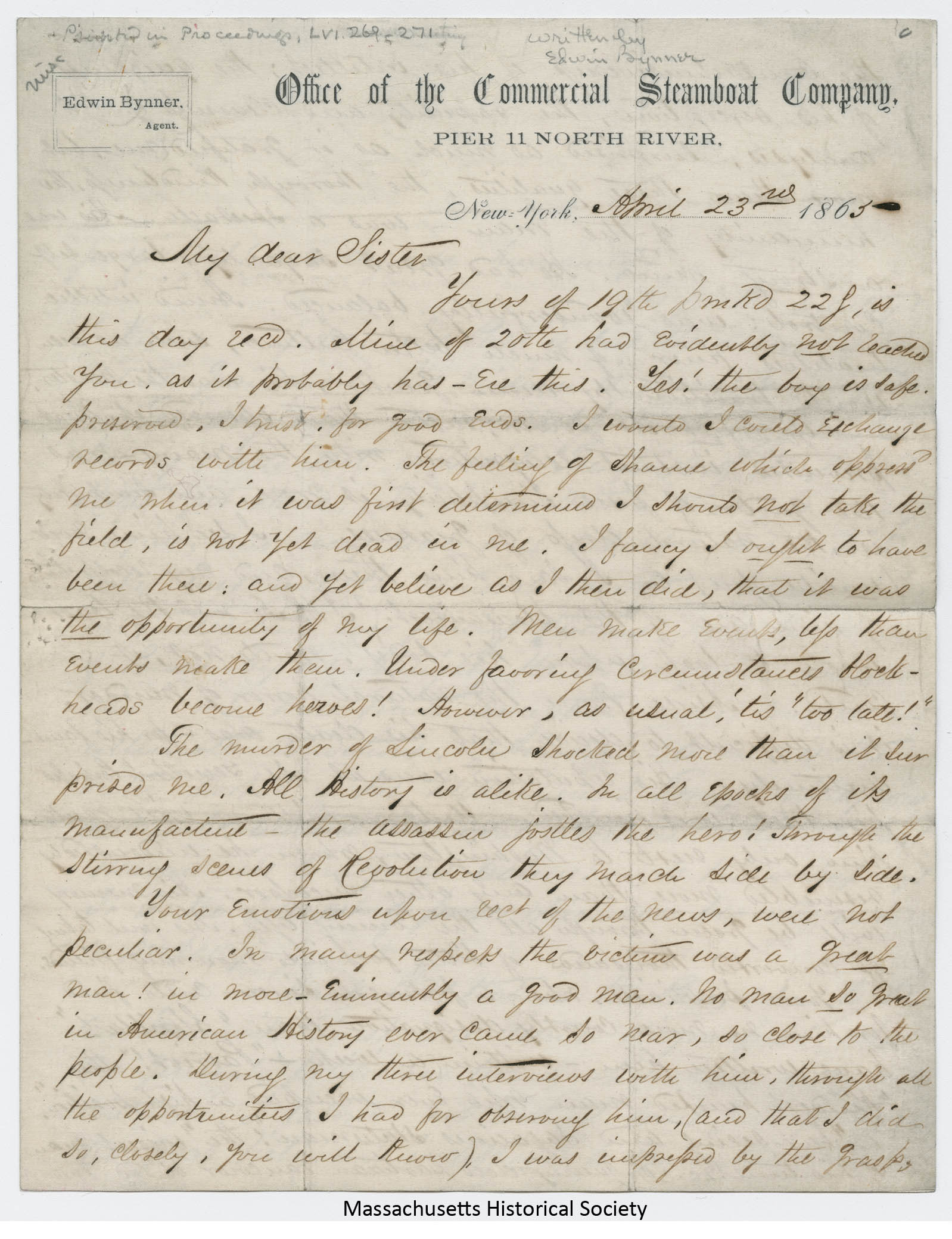
-
Description
In this letter written by Edwin Bynner, an agent of the Commercial Steam Boat Company in New York, to his sister, Bynner describes his reaction and thoughts about Abraham Lincoln and the assassination. Bynner comments that he is more shocked than surprised at the assassination and recalls the greatness and humanity of Abraham Lincoln. Bynner states that during his three interactions with Lincoln he observed firsthand Lincoln's intellect and perceptiveness. Bynner was impressed with Lincoln's strong mind.
-
Source
Massachusetts Historical Society, Miscellaneous manuscripts collection
-
Rights
Use of this item for research, teaching, and private study is permitted with proper citation and attribution, as: From the Collection of the Massachusetts Historical Society. Reproduction of this item for publication, broadcast, or commercial use requires written permission. For permission, please see this web page.
-
Creator
Bynner, Edwin
-
Date
April 23, 1865
-
Material
25 cm x 19.7 cm
from Apr. 14, 1865
Senator Alexander Ramsey Diary
-
Full Title
Senator Alexander Ramsey's Diary Entries, April 1865
-
Description
Senator Ramsey of Minnesota was in Washington D.C. when President Lincoln was assassinated. These are his diary entries from when it happened, including details as he heard them; being part of President Johnson inauguration; and his participation in the congressional escort on Lincoln's funeral train.
-
Transcription
April 14, 1865
At 10 ½ pm at Fords Theater the Presd. of U.S. was shot by J. Wilkes Booth of which he died. Booth escaped.
Mr. Secretary Seward and his son Frederick and the male servant of the Secretary were attacked (?) at the same time by an accomplice of B. with a knife – and is lingering with little hope of their recovery.
The President died at 7 ½ a.m.
Was present with Hon. Senators Foote of Vt. Gates of Ill. And Steward of Nevada at the inauguration of V. Pres. Johnson as Presd. about 10 in all witnessed the administration of the oath at 11 am by Chf. Justice Chase.
Cigar .30
Newspapers 5 & 16 .21
Boot(?) knife
Paid for use of above senators and myself for carriage 5.00
April 21, 1865
Left Washington as one of a congressional escort in conveying the body of Abm. Lincoln late Presid. of U.S. from Washington to Springfield. Left at 8 a.m. reached Baltimore at 10 and left at 5 PM and reached Harrisburg at 8 pm
(?) Trunk .50
at Baltimore .30
-
Source
Alexander Ramsey and Family Papers, Minnesota Historical Society
-
Rights
Use of this item for research, teaching, and private study is permitted with proper citation and attribution, as Alexander Ramsey and Family Papers, Minnesota Historical Society, Minnesota Historical Society. Reproduction of this item for publication, broadcast, or commercial use requires written permission. For permission, please see this web page.
-
Tags
-
Cite this Item
Alexander Ramsey. "Senator Alexander Ramsey's Diary Entries, April 1865". Remembering Lincoln. Web. Accessed June 15, 2025. https://rememberinglincoln.fords.org/node/292
from Apr. 14, 1865
Senator Alexander Ramsey's Diary Entries, April 1865
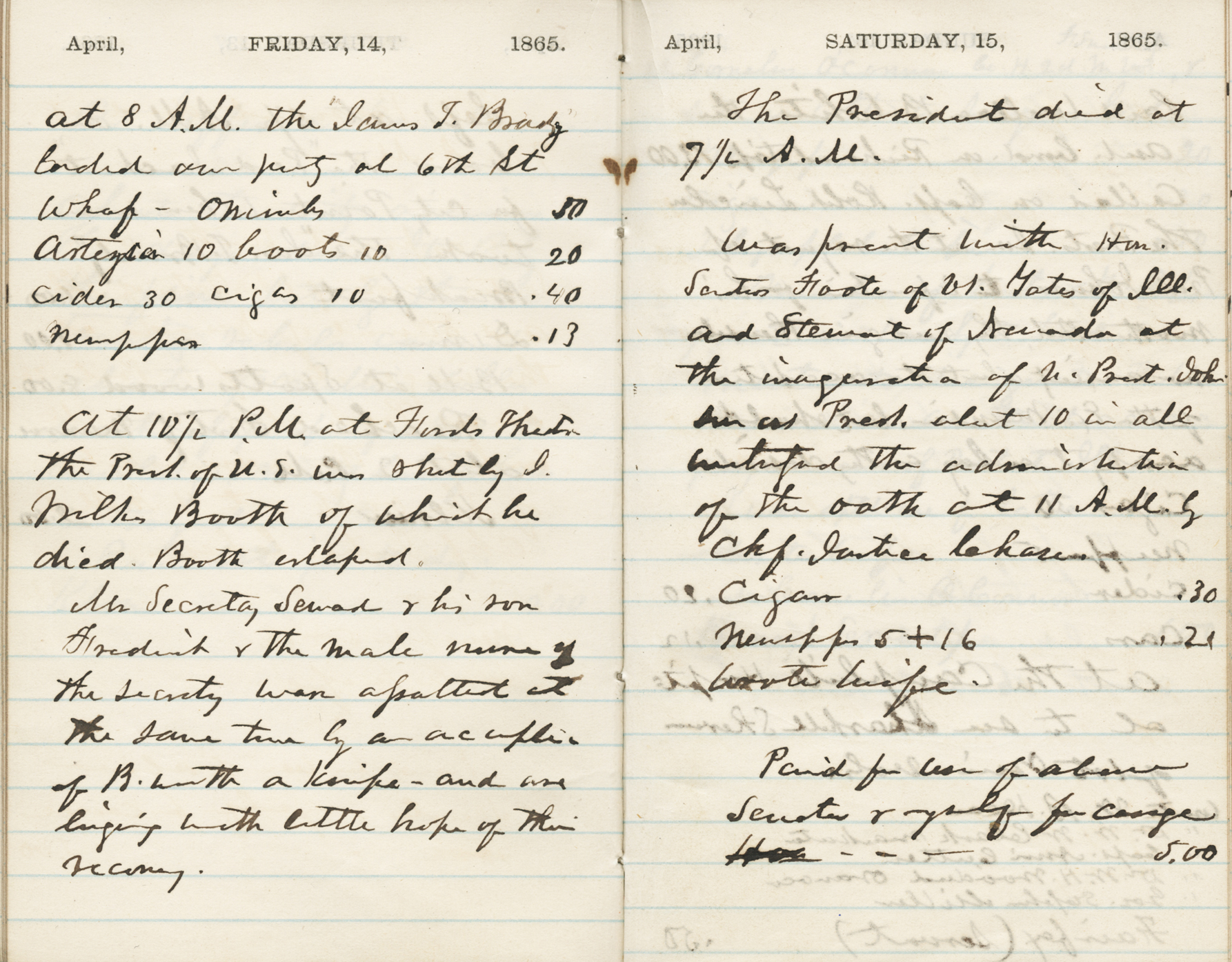
-
Description
Senator Ramsey of Minnesota was in Washington D.C. when President Lincoln was assassinated. These are his diary entries from when it happened, including details as he heard them; being part of President Johnson inauguration; and his participation in the congressional escort on Lincoln's funeral train.
-
Source
Alexander Ramsey and Family Papers, Minnesota Historical Society
-
Rights
Use of this item for research, teaching, and private study is permitted with proper citation and attribution, as Alexander Ramsey and Family Papers, Minnesota Historical Society, Minnesota Historical Society. Reproduction of this item for publication, broadcast, or commercial use requires written permission. For permission, please see this web page.
-
Creator
Alexander Ramsey
-
Date
April 14, 1865
from Jan. 1, 1907
Alice Strickler Keyes diary entry
-
Full Title
Alice Strickler Keyes diary entry
-
Description
Alice Strickler Keyes eyewitness account of the day that Lincoln’s funeral train stopped in Columbus, Ohio, on its way to Springfield, Illinois, where the remains of the president and those of his son Willie would be buried. This account is an excerpt from the Alice Strickler Keyes diary passage in the Altrurian Club of Columbus, Ohio President's Book.
-
Transcription
[Page 1]
25
These grounds, at the head of State street, it was so far from the town and in such a swampy and unimproved district, that it too was dubbed “Swayne’s Folly.” Noah Swayne became most widely known as Justice of the Supreme Court of the United States.
His home at the head of State street was later occupied by J. Ewing Miller. Its site is now that of the Carnegie Library.
Before the “Insane Asylum” burned, the terminus of all our walks eastward, was the great flat boulder, that still lies on the sidewalk in the east Broad street, east of Jefferson Avenue.
A little farther east the Asylum Grounds ended, and not far beyond, lay “Riley’s Woods,” and the open country.
In April, 1865, Columbus with the rest of The Nation was celebrating the “Fall of Fort Sumpter,” the surrender of General Lee, and the End of the “Civil War.” There was great rejoicing.
April 14th was appointed by Governor Brough as a day of thanksgiving. On that day there were services in the churches in the morning;—in the afternoon
[Page 2]
26
and evening everything was done that is possible on such occasions to express the joy of the citizens. The town was lavishly decorated.
The next morning, April 15th all this joy was turned to sorrow when the news of President Lincoln’s assassination reached the city. The emblems of Victory gave place to those of mourning for the fallen Chief.
It was learned a few days later, that the funeral train on its way to Springfield, Illinois, would stop in Columbus, and that the body of the President would lie in state for one day, in the Rotunda of the Capitol.
At school we were told that the city Fire Department would be in the procession to meet the train at the station, and that a number of young girls, dressed in deep mourning were wanted—one to stand beside each driver on the fire engines, and many others to ride on the large “Hook and Ladder” wagon, reconstructed for the occasion.
[Page 3]
27
This plan was carried out. Forty-two school girls of varying ages, of whom I was one, rode on this car, massed around one of our teachers (Miss Sarah Smith) who was heavily draped in black and represented “Columbia.”
After the coffin of President Lincoln was placed on the splendid funeral car, the procession started back on its route through the streets of the city.
At intervals the black robed girls on the float, led by their teacher, sang verses from dirge-like hymns.
When the procession stopped at the gate of the Capitol, these girls left their float and were led into the building, and past the coffin of the President. It is said over fifty thousand people viewed “the remains” that day.
The catalogue used to carry the body of President Lincoln had a canopy shaped like a pagoda. It was large, covered with black cloth, festooned, and trimmed with silver fringe. It was drawn by six white horses with large black plumes on their heads. The horses had a covering of black cloth edged with silver fringe, and each horse was led by a groom dressed in black.
[Page 4]
28
The silver fringe used to trim the funeral car of President Lincoln in Columbus, was afterward turned over to women of one of the church societies, to make into souvenirs to be sold, and I was able to secure a piece of it.
The historian of the “Altrurian Club” (Mrs. Cope) has asked for a small portion of the fringe to be attached to this record of my recollections, and I am happy to give this tiny, precious relic to “Altrurian Club,” of which I am a charter member, and through all the years of its existence, without a break, a constant and loyal member.
Alice S. Keyes
(Mrs. Elias A. Keyes.)
[piece of silver fringe attached]
[Transcription by McCaela Michas]
-
Source
-
Rights
Use of this item for research, teaching, and private study is permitted with proper citation and attribution, as Courtesy of the Ohio History Connection, Abraham Lincoln Presidential Collection . Reproduction of this item for publication, broadcast, or commercial use requires written permission. For permission, please see this web page.
-
Tags
-
Cite this Item
Keyes, Alice Strickler. "Alice Strickler Keyes diary entry". Remembering Lincoln. Web. Accessed June 15, 2025. https://rememberinglincoln.fords.org/node/282
from Jan. 1, 1907
Alice Strickler Keyes diary entry
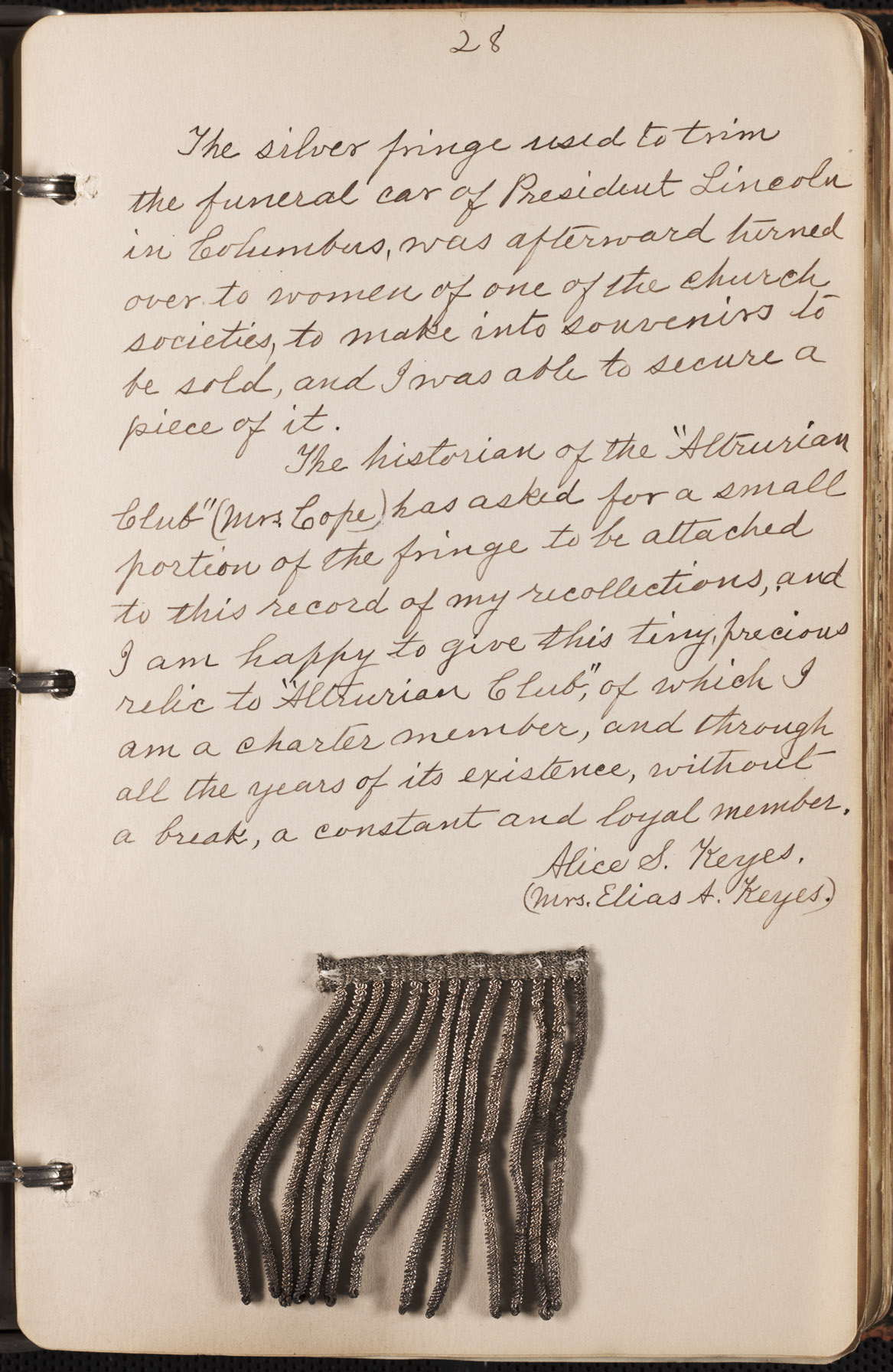
-
Description
Alice Strickler Keyes eyewitness account of the day that Lincoln’s funeral train stopped in Columbus, Ohio, on its way to Springfield, Illinois, where the remains of the president and those of his son Willie would be buried. This account is an excerpt from the Alice Strickler Keyes diary passage in the Altrurian Club of Columbus, Ohio President's Book.
-
Source
-
Rights
Use of this item for research, teaching, and private study is permitted with proper citation and attribution, as Courtesy of the Ohio History Connection, Abraham Lincoln Presidential Collection . Reproduction of this item for publication, broadcast, or commercial use requires written permission. For permission, please see this web page.
-
Creator
Keyes, Alice Strickler
-
Date
January 1, 1907
from May. 6, 1865
Britannia Sympathises with Columbia
-
Full Title
Britannia Sympathises with Columbia
-
Description
Cartoon from the British newspaper Punch which appeared in the May 6, 1865 issue. This copy is later and includes the note in manuscript. "Copied from the original for A. Boyd" (likely Andrew Boyd of Albany).
-
Source
Kislak Center for Special Collections, Rare Books and Manuscripts, University of Pennsylvania Libraries. Gordon Block Collection of Lincolniana, UPenn Ms. Coll. 941, Box 3 Folder 14
-
Rights
This item is in the Public Domain.
-
Tags
-
Cite this Item
Tenniel, John, 1820-1914. "Britannia Sympathises with Columbia". Punch. Remembering Lincoln. Web. Accessed June 15, 2025. https://rememberinglincoln.fords.org/node/293
-
Creator
Tenniel, John, 1820-1914
-
Publisher
Punch
-
Date
May 6, 1865
from May. 6, 1865
Britannia Sympathises with Columbia

-
Description
Cartoon from the British newspaper Punch which appeared in the May 6, 1865 issue. This copy is later and includes the note in manuscript. "Copied from the original for A. Boyd" (likely Andrew Boyd of Albany).
-
Source
Kislak Center for Special Collections, Rare Books and Manuscripts, University of Pennsylvania Libraries. Gordon Block Collection of Lincolniana, UPenn Ms. Coll. 941, Box 3 Folder 14
-
Rights
This item is in the Public Domain.
-
Creator
Tenniel, John, 1820-1914
-
Publisher
Punch
-
Date
May 6, 1865
from Apr. 25, 1865
Idaho Statesman, April 25, 1865.
-
Full Title
Idaho Statesman, April 25, 1865.
-
Description
This is an extra evening edition of the Idaho Statesmen published as soon as reports of the assassination reached the state. Reads, "The details, which we present to our readers in this extra, constitute a chapter of horrors that neither history nor fiction can parallel. The murder of Caesar by Brutus, the assassination of Henry the Fourth by Ravaignac, sink into insignificance when compared with the terrible daring and fearful coolness which characterizes the perpetration of these deeds."
-
Source
Idaho Historical Society
-
Rights
Use of this item for research, teaching and private study is permitted with proper citation and attribution, as defined here. Reproduction of this item for publication, broadcast or commercial use requires written permission.
-
Tags
-
Cite this Item
Idaho Statesman. "Idaho Statesman, April 25, 1865. ". Remembering Lincoln. Web. Accessed June 15, 2025. https://rememberinglincoln.fords.org/node/318
-
Creator
Idaho Statesman
-
Date
April 25, 1865
from Apr. 25, 1865
Idaho Statesman, April 25, 1865.
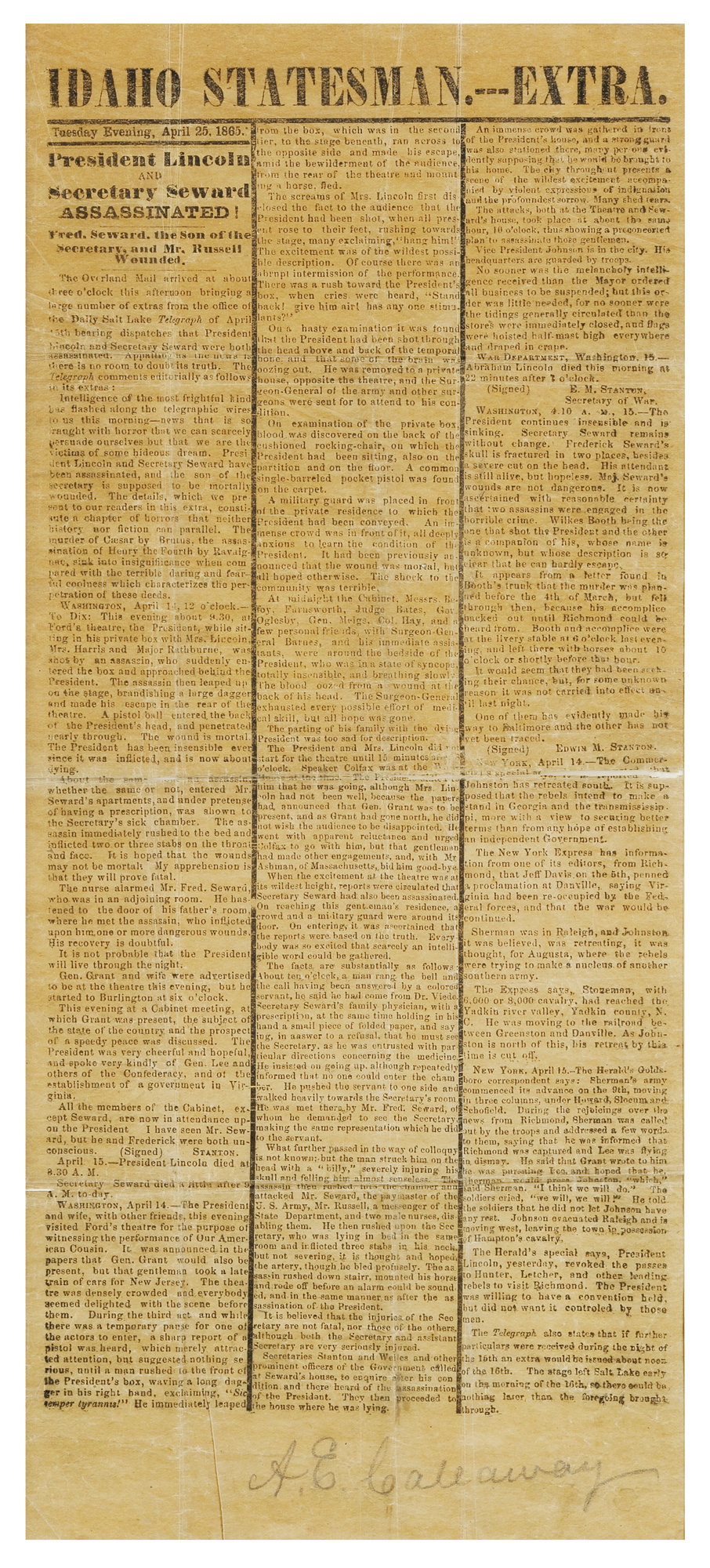
-
Description
This is an extra evening edition of the Idaho Statesmen published as soon as reports of the assassination reached the state. Reads, "The details, which we present to our readers in this extra, constitute a chapter of horrors that neither history nor fiction can parallel. The murder of Caesar by Brutus, the assassination of Henry the Fourth by Ravaignac, sink into insignificance when compared with the terrible daring and fearful coolness which characterizes the perpetration of these deeds."
-
Source
Idaho Historical Society
-
Rights
Use of this item for research, teaching and private study is permitted with proper citation and attribution, as defined here. Reproduction of this item for publication, broadcast or commercial use requires written permission.
-
Creator
Idaho Statesman
-
Date
April 25, 1865
